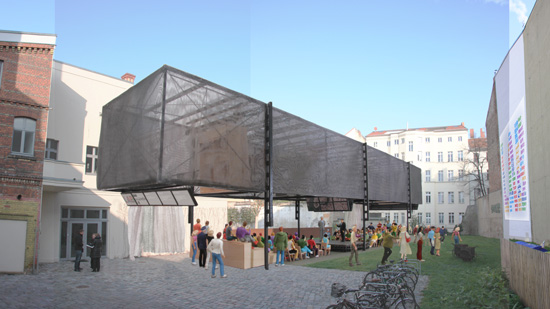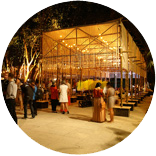Press Release

Opening June 15, 2012, in Berlin,
BMW Guggenheim Lab Announces First Three Weeks of Programs
BERLIN / NEW YORK, May 21, 2012 – The BMW Guggenheim Lab Berlin— a temporary public space and online forum encouraging open dialogue about issues related to urban life—will present more than one hundred free events and a broad range of public programs from June 15 to July 29, 2012. Located in the Pfefferberg complex in Berlin’s Prenzlauer Berg neighborhood, the Lab will host lectures, discussions, and hands-on workshops, as well as off-site tours of the urban environment throughout Berlin.
The BMW Guggenheim Lab Berlin will explore new concepts and designs for city life. The Berlin program is focused on the importance of making one’s own city, with programs designed to empower residents with tools and ideas to proactively participate in city change. Berlin is the second stop on the Lab’s six-year, nine-city global tour, which began in New York last August.
"We are very excited that the BMW Guggenheim Lab Berlin will focus on the importance of doing and making, a theme rooted in Berlin’s proud tradition of citizen participation and ground-up philosophy," states Lab curator Maria Nicanor. "Our aim is to foster meaningful dialogue with the residents of Berlin and explore the community's interests as well as ideas that have relevance all around the world."
The BMW Guggenheim Lab is a combination public forum, community center, and think tank that is open to all and that encourages people to participate, discuss, and share their knowledge and ideas. “The Guggenheim has long believed that art and culture can be agents of social change, but the scope and scale of the BMW Guggenheim Lab, which takes programming out into the fabric of people’s daily lives in cities around the world, is a first for the Guggenheim,” says Richard Armstrong, Director of the Solomon R. Guggenheim Museum and Foundation. “As a city respected worldwide for its creativity and critical mind, Berlin was a natural choice for this pioneering project.”
All programs have been created by the Berlin Lab Team (José Gómez-Márquez, Rachel Smith, Corinne Rose and Carlo Ratti), an international, multidisciplinary team of innovators and experts led by Guggenheim curator Maria Nicanor, with contributions from local organizations. Programs concentrate on four main topics organized around the theme of the Lab’s first two-year cycle, Confronting Comfort:
Empowerment Technologies (June 15–24)
José Gómez-Márquez, The Little Devices Group at the Massachusetts Institute of Technology, Boston, and a pioneer in the field of health technology innovations, will lead a series of “do-it-yourself” workshops focused on building one’s own city by “hacking” and transforming urban spaces.
Dynamic Connections (June 27–July 6)
Rachel Smith, principal transport planner with AECOM, based in Brisbane, Australia, will lead programs focused on sustainable mobility and community-building.
Urban Micro-Lens (July 7–18) Berlin-based artist
Corinne Rose, who works with photography and video and teaches at the Bern University of the Arts, Switzerland, will explore the intersection between psychology, architecture, and art with programs that address perception, communication, and emotions in city life.
SENSEable City (July 19–29)
Architect and engineer Carlo Ratti, who practices in Italy and directs the SENSEable City Lab at the Massachusetts Institute of Technology, Boston, will lead programs examining how new technologies are transforming the way we understand, design, and live in cities.
For more information on the first three weeks of programming, from June 15 to July 6, please see the supplement to this release. [Note: This is the first in a regular series of updates about BMW Guggenheim Lab Berlin programming. Information will continue to be disseminated as programs, dates and details are confirmed.]
The BMW Guggenheim Lab Berlin will be presented in collaboration with ANCB —Metropolitan Laboratory.
For regular updates, please also visit: bmwguggenheimlab.org.
The Lab is located at Schönhauser Allee 176 in the Pfefferberg complex, a former nineteenth-century brewery. The Lab is open Wednesday through Friday, 2–10 pm and Saturday and Sunday, 12–10 pm. All events are free of charge and will be offered in German or English with German translation.
Opening Dates
June 15 – July 29, 2012
Location
Most programs listed in the supplement to this release will take place at the BMW Guggenheim Lab, located in the northern courtyard (Hof 3) of the Pfefferberg complex at Schönhauser Allee 176, Berlin. (Public transport: U2 Senefelderplatz.)
Programs such as guided tours, field trips, and walking workshops will meet at the Lab before moving off-site.
Hours of Operation
Wednesday 2–10 pm
Thursday 2–10 pm
Friday 2–10 pm
Saturday 12–10 pm
Sunday 12–10 pm
(Closed Monday and Tuesday)
Admission
Free (some programs require online RSVP)
About the BMW Guggenheim Lab
Housed in a mobile structure designed by Tokyo architecture firm Atelier Bow-Wow, the BMW Guggenheim Lab launched in the summer of 2011 in New York. Over six years, the BMW Guggenheim Lab will travel to a total of nine cities around the world in three successive two-year cycles, each with its own theme and structure. Following Berlin—the second stop of the tour—the BMW Guggenheim Lab will travel to Mumbai in winter 2012-13. The Lab is curated by David van der Leer and Maria Nicanor of the Guggenheim Museum.
The BMW Guggenheim Lab's website (bmwguggenheimlab.org), blog (blog.bmwguggenheimlab.org), interactive Urbanology game, and online communities further extend the opportunity to participate in this multidisciplinary urban experiment worldwide. Visitors are invited to become members of the BMW Guggenheim Lab's dedicated social communities at:
twitter.com/bmwgugglab and #BGLab
facebook.com/bmwguggenheimlab
youtube.com/bmwguggenheimlab
flickr.com/bmwguggenheimlab
foursquare.com/bmwgugglab
About the Architecture and Design
Lightweight and compact, with a structural skeleton built of carbon fiber, the mobile structure for the first cycle of the BMW Guggenheim Lab has been designed by the Tokyo architecture firm Atelier Bow-Wow as a “traveling toolbox.” The structure’s lower half is a present-day version of the Mediterranean loggia, an open space that can easily be configured to accommodate the Lab’s various programs. The upper part of the structure houses a flexible rigging system and is wrapped in a semitransparent mesh. Through this external skin, visitors are able to catch glimpses of the extensive apparatus of “tools” that may be lowered or raised from the canopy according to the Lab’s programming needs, transforming the ground space into a formal lecture setting, a stage for a celebratory gathering, or a workshop with tables for hands-on experiments.
The graphic identity for the first cycle of the BMW Guggenheim Lab has been developed by Seoul-based graphic designers Sulki & Min.
Contacts
Germany:
artpress – Ute Weingarten, Marie Skov
(49) 30 4849 6350
This e-mail address is being protected from spambots. You need JavaScript enabled to view it
Adriana Ellermann, Häberlein & Mauerer
(49) 89 3810 8237
This e-mail address is being protected from spambots. You need JavaScript enabled to view it
International:
Kate Lydecker, Ruder Finn Arts & Communications Counselors
212 715 1602
This e-mail address is being protected from spambots. You need JavaScript enabled to view it
For complete press materials, go to bmwguggenheimlab.org/presskits
For publicity images, go to bmwguggenheimlab.org/pressimages
For publicity videos, go to bmwguggenheimlab.org/pressvideos
User ID = photoservice, Password = presspass
May 21, 2012
#1241/BGL16

